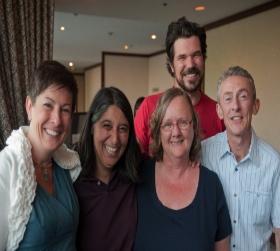More than 100 community activists, organizers and academics from across the country gathered in Vancouver from Aug 26 to 28 to discuss the history and future of sex activism in Canada.
The We Demand conference was the first in Canada dedicated to the history of sexuality since 1993. It coincided with the 40th anniversary of the first time Canadians protested publicly for gay rights.
Feminism, sex work, and marriage and family were some of the most repeated themes. Scholars from as far away as Texas and the United Kingdom presented academic works alongside a host of local sexual and political activists, including Little Sister’s Janine Fuller, BC gay archivist Ron Dutton and lawyer barbara findlay.
A roundtable discussion on the first day recalled the original We Demand demonstrations and their importance in gay Canadian history.
Aboriginal and sexual rights activist Jessica Yee delivered a rousing keynote speech on Saturday, questioning why the history of Canadian sexual activism centred only on the last 50 years. Yee asked why the story of how repressive colonial sexual laws were introduced is rarely told.
Sharalyn Jordan of the Rainbow Refugee Committee echoed Yee’s concerns at Sunday’s endnote panel. “We need to look not at just how we won rights but the process of how they were taken away,” Jordan said.
At multiple points during the conference, several community members expressed frustration over what they described as overly dense and incomprehensible academic language. They applauded the work being done but questioned how it could be made more accessible to those outside of academia.
Several panellists spoke about the need to more fully address and include trans issues and the issues of race, class and power in their work, beyond merely acknowledging them.
Volunteer and Simon Fraser University student Kathleen Davidson found the weekend to be a welcome change from other academic environments where queer studies aren’t always fully accepted.
“It was a great opportunity for queer scholars to come together and to be able to share their work and learn from other people’s work and not feel like they were the oddities or feel like they were on the fringe,” says Davidson.
Though the focus was on history, the conversation kept coming back to present-day activism.
Raven Bowen, a Vancouver sex worker activist and organizer, reflected on the lessons she learned from the conference as one of a trio of endnote speakers. She explained that the advent of social media, such as Twitter and Facebook, has changed the realities of modern activism.
“You really have to commit to the activism you’re doing because you will be attached to that for life,” says Bowen.
In one of the final dialogues, volunteer Ivan Drury urged participants to look at how their work could be directly related and applied to present-day activism. “We’re at a crisis where political radicals among students are probably at a historic low right now,” says Drury. “Professors are largely more radical than their students. It should really be the other way around.”

 Why you can trust Xtra
Why you can trust Xtra


